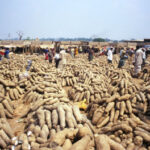The federal government has shown demonstrable energy at increasing the production of wheat in the country. If this is done, it will not only assist in getting more food for the people, it will also reduce dependence on foreign countries. And wait for this: the economy will also breathe because the amount of foreign exchange expended on imported foods will come down.
President Bola Tinubu had said in his maiden new year broadcast that his government was working on getting over one million metric tons of wheat from the efforts being put in place to give the needed support to farmers. To achieve this objective the government has decided to support between 150,000 and 250,000 farmers by giving them a 50-percent subsidy on farm inputs that will enable them to cultivate about 250,000 hectares of land to produce wheat. Since the war between Russia and Ukraine there had been a phenomenal increase in the prices of grains, particularly wheat and maize.
Available statistics show that wheat is the third most imported item after petrol and gas oil. It accounts for 3.9 percent of total imports. In the third quarter of 2023 alone wheat imports gulped N331.76 billion. Nigeria imports from countries like Poland, which benefitted N90.46 billion from Nigeria in the third quarter of that year and Canada, which took N73 billion of Nigeria’s foreign exchange within the same period in exchange for wheat. Durum wheat, the species that the country imports, is used for the production of semolina, pasta, noodles and bread.
If Nigeria succeeds in increasing its wheat production, the effect will the felt not just in the availability of local foods but in the decline of the amount of foreign exchange spent on imports, even as the balance of trade will begin to weigh in favour of Nigeria. First, the huge amount spent on imports would have been saved, and Nigeria would no longer depend on external production to feed her population. That amount can be spent to provide some other facilities for the comfort of Nigerians.
The Central Bank of Nigeria, CBN will be relieved, as the pressure on the naira will reduce, thus leading to a better value of the currency. That will mean that there will be better days for Nigeria. There is yet a great advantage the development will bring to the country. This is the farmers and other principals in the value chain will provide employment to fellow citizens. Each time a country imports goods from other countries, it is providing jobs for citizens of the countries from which it imports. When the situation is reversed, the country that had hitherto depended on imports will then provide jobs at home and run an economy that tends towards being self-sufficient.












